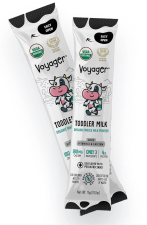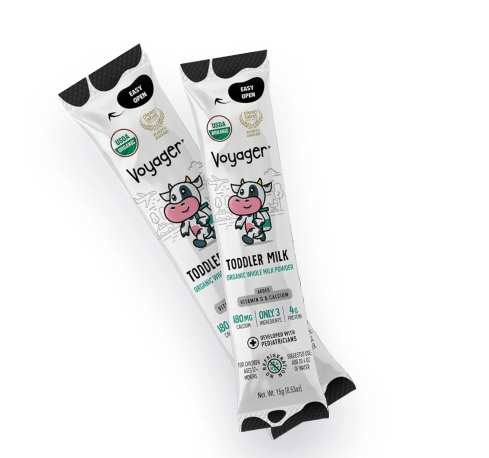
Best Brain-Boosting Foods and Nutrients for Growing Toddlers
Every parent looks forward to watching their child develop into bright, curious, and confident individuals. Most people do not understand that this journey begins much sooner than imagined—at the dinner table.
In the early stages of the toddler years, a child’s brain grows immensely, absorbing every experience, every sound, and every taste. Nutrition for a toddler can help lengthen their attention span, promote emotional balance, and improve focus. Thoughtful choices can help nurture the developing brain of a toddler. Learn more about the brain-boosting foods for toddlers and how they can promote learning, imagination, and increase overall brain development.
Why Nutrition Is Vital for Toddler Brain Development
The toddler stage is a period of remarkable transformation and development, where millions of neural connections are made daily. This stage sets the foundation for future learning, behavioral development, and emotional strength.
Nutrition provides various benefits, some of which are:
- Increased attention span and improved learning abilities.
- Better emotional and social skills.
- Strong immune system and physical development.
With a balanced diet, a toddler's brain will develop at optimum levels while memory, creativity, and overall spatial intelligence are developed. To top it all off, organic toddler milk can further promote brain development, nutrient absorption, and other vital brain-supporting minerals.
Key Nutrients That Fuel Brain Development
Certain nutrients for toddlers are the building blocks of brain cells and the neurotransmitters that aid learning and concentration. Below are the most essential nutrients required for every toddler’s brain development.
Omega-3 Fatty Acids
Strengthen the structure of brain cells, promote attention, and improve inter-neuronal communication. These can be obtained through fatty kinds of fish, flaxseeds, and chia seeds.
Iron
Aids in oxygen distribution to the brain and prevents sluggish cognitive development and learning. It can be found in spinach, lentils, eggs, red meat, and fortified cereals.
Choline
Aids in cognitive development and memory formation. It can be found in egg yolks, poultry, dairy, and milk-based toddler products.
Zinc and Iodine
Enhance problem-solving abilities and regulate and modulate cognitive hormones. It is found in beans, seafood, dairy, and iodized salt.
Vitamins B6, B12, and D
Promote neurotransmitter activity and alertness. These help supervise Baby Food Safety by maintaining nutrient absorption and preventing degradation during storage. They are found in fish, eggs, fortified milk, and are essential for Vitamin D synthesis through sunlight.
Top Brain-Boosting Foods for Growing Toddlers
A toddler’s daily meals have to be diverse and packed with nutritionally beneficial foods to aid their cognitive and physical growth properly. Below are some of the most ultimate healthy foods and snacks for brain development that are also enjoyable to eat.
Fatty Fish (Salmon, Sardines)
Salmon and sardines are brain development powerhouses that are loaded with the healthy fats DHA and EPA. Prepare toddler-friendly meals by making small salmon patties and serving them with rice.
Eggs
Eggs are enriched with choline and protein. Both improve focal attention and help with memory retention. For a quick, nutritious snack, serve soft omelet, scrambled eggs, or sliced boiled eggs.
Leafy Greens (Spinach, Kale)
To understand toddlerhood, leafy greens are enriched with folate, iron, and antioxidants. These key elements are essential to help safeguard the brain cells and promote energy. You can blend them into a smooth paste, turning it into smoothies, sauces, or soups, especially for the choosy eaters.
Berries (Blueberries, Strawberries)
Berries, especially blueberries and strawberries, are great snacks that are rich in antioxidants, which help with memory and brain coordination. They can be added to smoothies or served as a fun topping for yogurt and oatmeal.
Nuts and Seeds (Walnuts, Chia Seeds, Flaxseeds)
Nuts, especially walnuts, and seeds, like chia and flax, are excellent sources of omega-3 and omega-6 fatty acids and healthy fats. These also help repair the brain and enhance its functions. You can sprinkle crushed nuts and seeds in porridges, muffins, or puddings.
Whole Grains (Oats, Quinoa, Brown Rice)
Whole grains provide a steady release of glucose and sustain toddlers' energy and attention all day long. They are great additions to breakfast bowls or mini pancakes.
Dairy and Toddler Milk
Dairy products and toddler milk provide calcium, vitamin D, and essential fatty acids important for brain and bone development. Depending on a child's taste preferences and dietary routines, parents can include these as part of balanced meals.
Smart Tips to Encourage Healthy Eating Habits
- When introducing new foods to your toddler, do so gradually
- Include toddlers in your simple food preparation tasks to grow their interest
- Blend brain-boosting foods into the meals they already love
- Avoid distractions during mealtimes and turn them into something positive
- Offer consistent hydration with milk or water instead of sugary drinks.
Common Mistakes Parents Make with Toddler Nutrition
- Overreliance on processed or sugary snacks hinders brain development.
- Ignoring portion balance or skipping key nutrients like iron or omega-3.
- Avoiding healthy fats due to fear of weight gain—these are vital for brain growth.
- Forgetting that a variety of colorful foods ensures nutrient diversity.
- Missing regular meal schedules that stabilize toddlers’ energy and mood.
Conclusion
Doing everything necessary to support your toddler's health and brain development is effortless. Everything starts with awareness, love, and nourishment, as these values are the driving factors for every parent.
Changes in daily habits and providing your toddler with a nutritious meal blend can support your child's growth. At Voyager Milk, we help parents who need the proper guidance to offer toddlers well-nourished meals. You can help them grow into a curious, bright thinker prepared to explore the world with thoughtful choices and every spoonful that you serve. Contact us today for more details!
Frequently Asked Questions
1. How does hydration influence a toddler’s brain development?
Proper hydration improves nutrient transport and focus. Even mild dehydration can reduce energy levels, affecting memory and learning efficiency in toddlers.
2. Can meal timing impact cognitive growth in toddlers?
Yes, regular meal timing stabilizes blood sugar levels, ensuring steady energy and better brain performance throughout your toddler’s daily routine.
3. Are organic snacks better for brain development?
Organic snacks limit chemical exposure and support cleaner nutrient intake since they result from pasture-based farming practices, helping developing brains grow without harmful additives or preservatives.
4. How can parents encourage mindful eating in toddlers?
Serve smaller portions, remove distractions, and talk about flavors or textures to help toddlers connect positively with nourishing food.
5. Do cooking methods affect the nutrients in toddler food?
Absolutely. Steaming or baking preserves more vitamins and minerals, while deep-frying or overcooking can reduce essential nutrient content.


